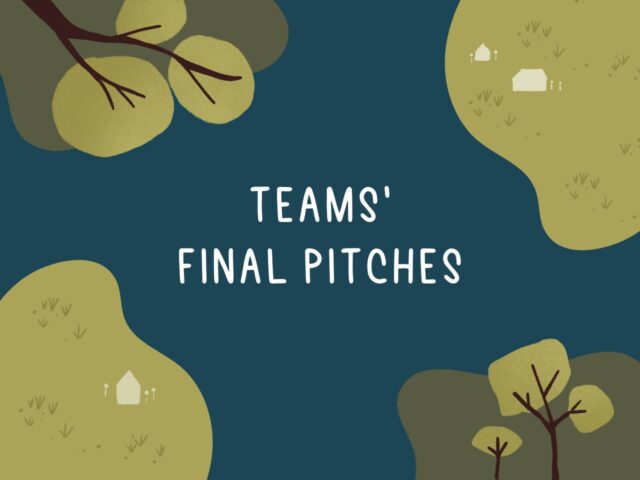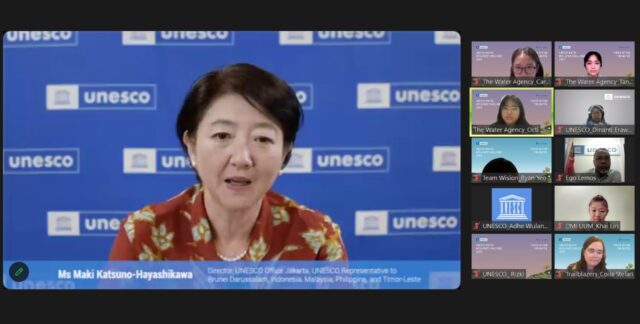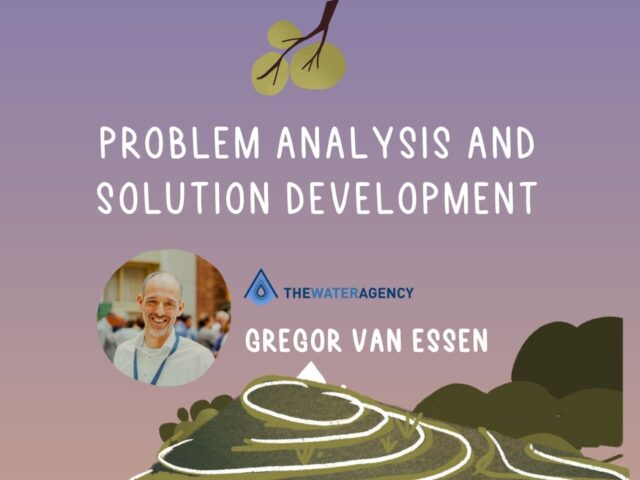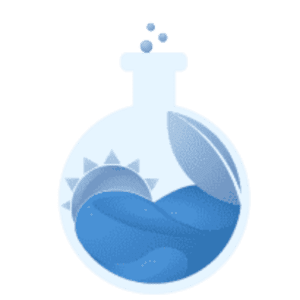We’ve reached the most exciting phase of the challenge, with teams presenting their final pitches to the judges. Numerous outstanding ideas have blossomed throughout the program, and as we await the results, let’s explore the details of each team’s proposal.
Team Amreta Max Win

Innovative IoT Based Precise Irrigation System for Agricultural Practices in UNESCO Geopark Ciletuh: Amreta Max Win proposes implementing a Precise Irrigation System based on the Internet of Things (IoT) to enhance the efficiency of water usage for irrigating rice fields. Consequently, irrigation channels can supply the appropriate amount of water to each rice field plot, reducing the risk of crop failure. Their proposed ideas will positively impact the community by reducing irrigation water shortage for paddy fields in Mandrajaya Village during the dry season, mitigating floods in the rainy season, and enhancing water efficiency in rice cultivation.
Team AquaCleanse Cambodia
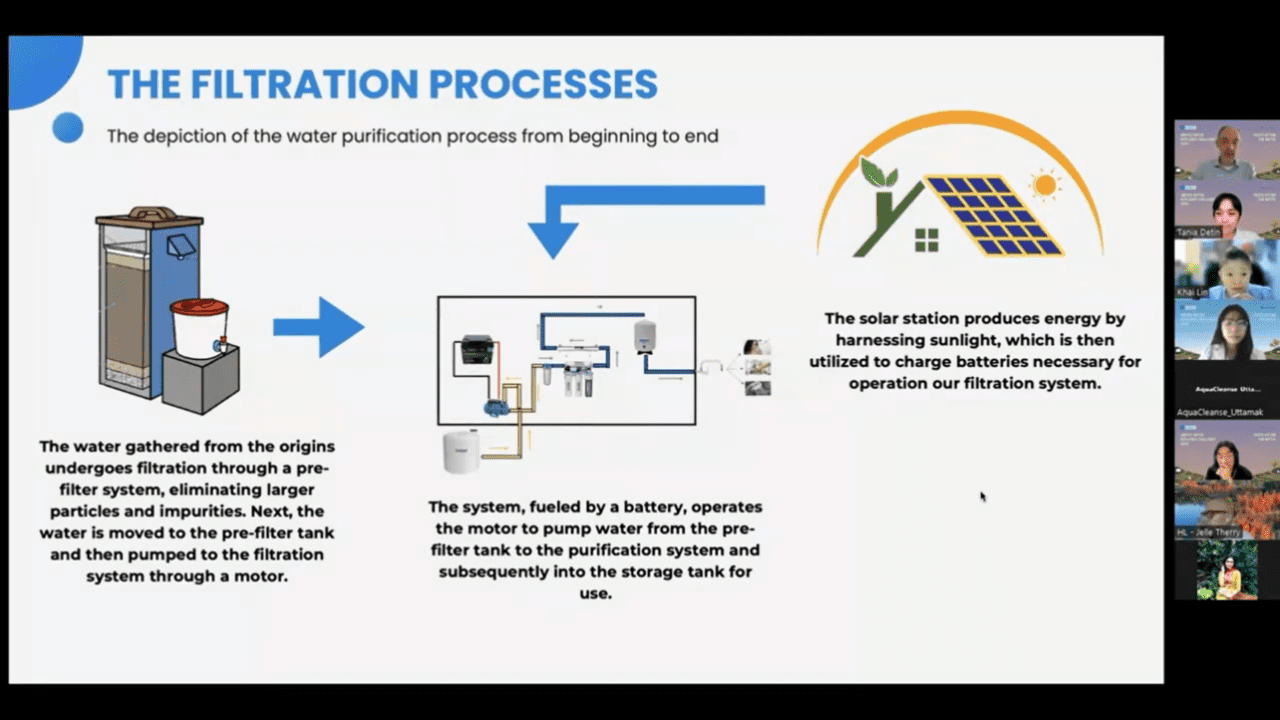
Solving the Water Challenge in Tonle Sap’s Floating Village – A Comprehensive Approach with Solar Water Purification and Compost Toilets: This team focuses on implementing a solar-powered water purification system, educating Chong Kneas’s villagers on the installation of composting toilets, and partnering with educational programs aimed at raising awareness on promoting water conservation and sanitation to prevent contamination. The plan is intended to foster sustainable practices that will lead to improved community health, promote environmental protection, and reduce the economic burden on the village.
AquaGuardian (Philippines)
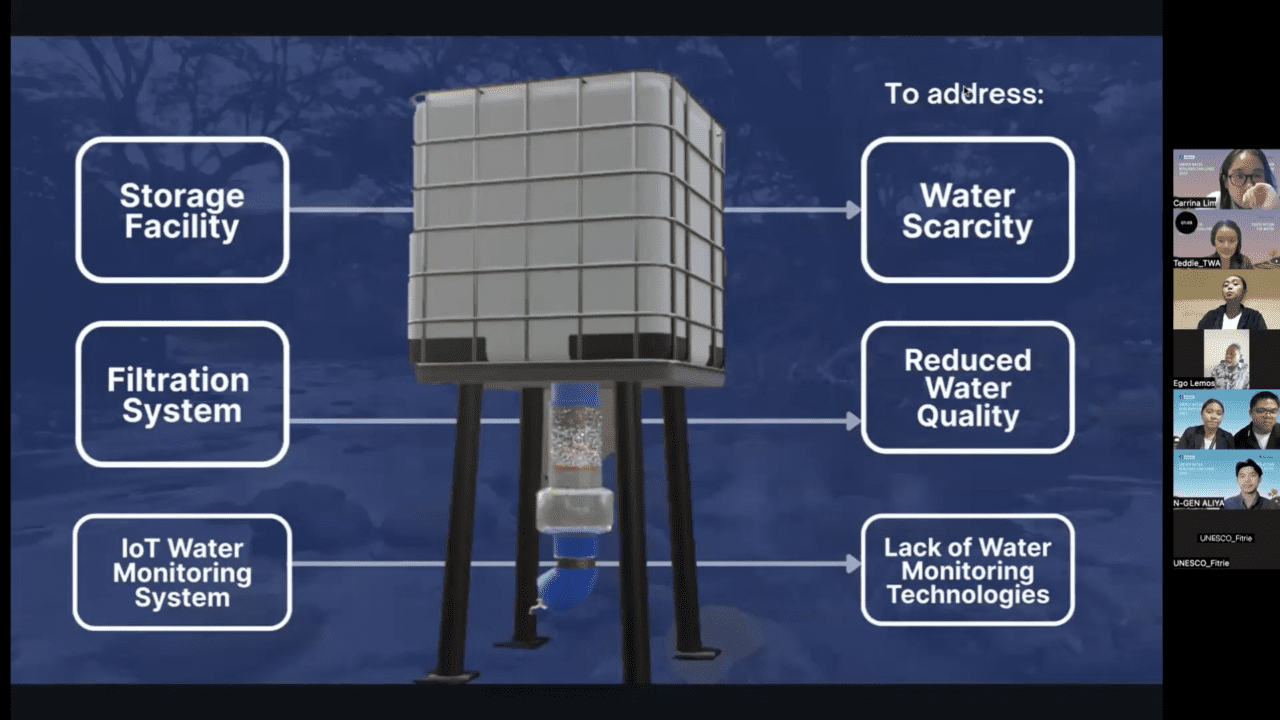
Ceramic Water Filtration and Storage with IoT based Water Quality Monitoring System: AquaGuardian’s idea aims to ensure reliable and clean water supply for coastal residents of Barangay Irawan through innovative integrated systems, fostering community collaboration for a sustainable future. Their concept includes two techniques: a Ceramic Water Filtration System and an IoT-based water Quality Monitoring System. The filtration system uses natural materials to filter out contaminants from water. The IoT-based monitoring system tracks pH, Total Dissolved Solids, and Total Suspended Solids, with data shared for analysis by government agencies.
Team CH2O
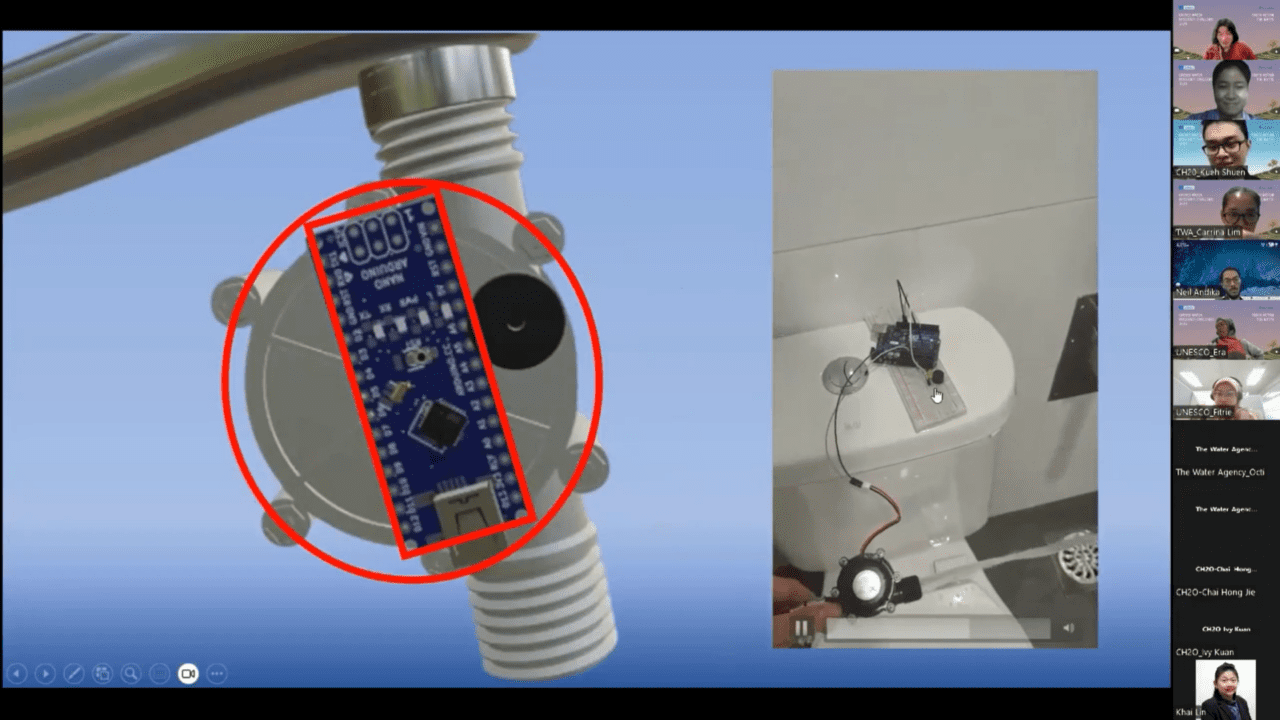
The AquaTally Project: CH2O aims to mitigate unnecessary water consumption in Pulau Langkawi by raising awareness and leaving a legacy of sustainable water management practices. The AquaTally device integrates a hydro turbine connected to an Arduino Nano, which is installed on taps, faucets, or shower heads to monitor water usage and trigger alerts, minimizing water wastage. The mobile application will then analyze data from the devices to identify water usage patterns and optimize conservation efforts.
Team Ecosolvers
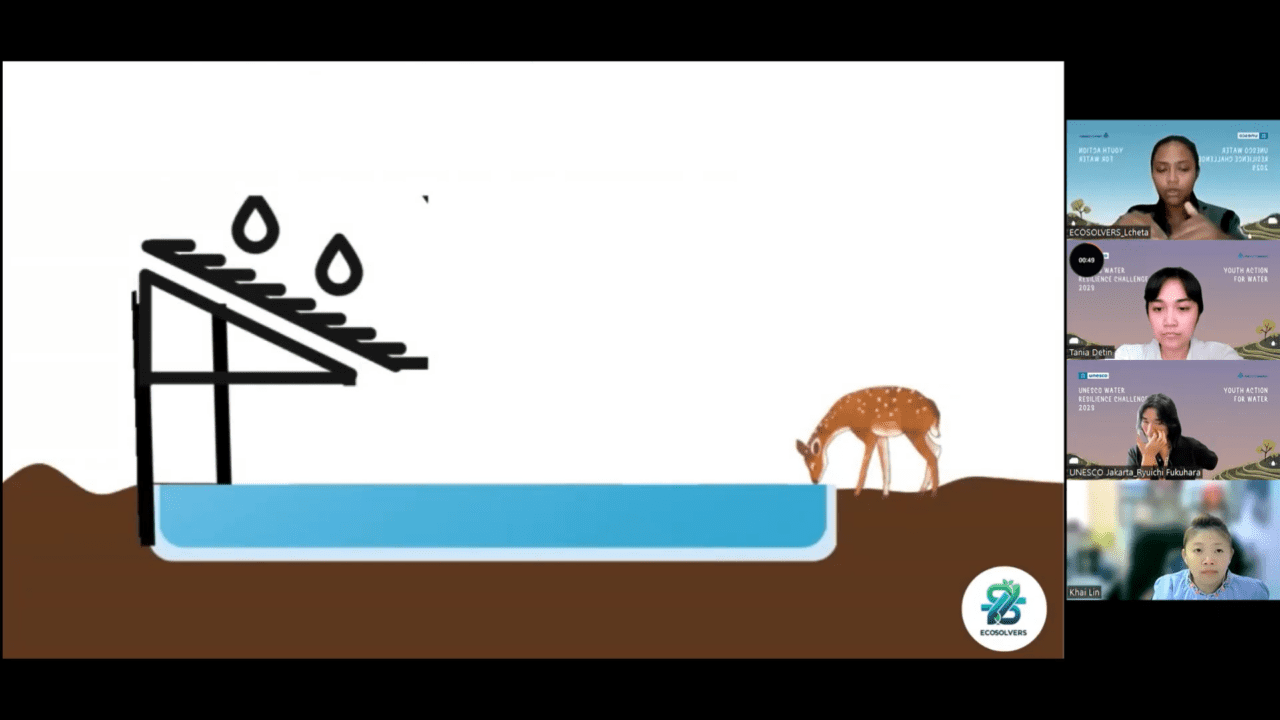
Preserving Deer Population in Nino Koni Santana National Park from Water Scarcity: Ecosolvers aims to alleviate water scarcity in Nino Koni Santana National Park through rainwater harvesting, in line with the vision to foster a thriving ecosystem where wildlife can thrive amidst sustainable water resources. The team will monitor rainwater collection and pond accumulation in real-time, making necessary adjustments while maintaining community involvement for future conservation efforts.
Team ESD

Rainwater Collection and Efficient Water Use Education at Biosphere Reserve in Cat Tien National Park: The project’s goal is to assist local communities in enhancing their self-sufficiency and resilience to cope with extreme weather conditions resulting from climate change by efficiently utilizing and safeguarding water resources. The team intends to achieve this objective by developing and building household rainwater harvesting systems, delivering training on cost-effective water usage, and carefully monitoring and evaluating the accumulated data.
Team Kemujan Water Group

Rainwater Catching to Achieve Water Resiliency in Dusun Butuh: Kemujan Water Group aims to educate Dusun Butuh residents about alternative ways of water collection. The focus is on ensuring the village’s water resiliency in the face of another dry season by saving and utilizing the accumulated rainwater droplets. They plan to implement communal rainwater harvesting as a solution to drought. This will involve collecting rainwater droplets from roofs and then transferring them to a naturally made tank, utilizing gravity.
Team Make Water OK

HydroData Hub: Make Water Ok team proposes to create landslide hazard maps for The Penang Hill Biosphere Reserve. This will help the government and stakeholders to generate and utilize the data for emergency planning and risk management. The idea includes two technologies – a Smart Water Meter (SWM) System and a Landslide Risk Assessment System. The SWM System will help identify consumption patterns, detect leaks, and manage demand, supporting water conservation efforts. On the other hand, the Landslide Risk Assessment System will identify areas at risk of landslides, making the data accessible to the public and serving as a crucial tool for emergency planning and risk management.
Team N-Gen Progress
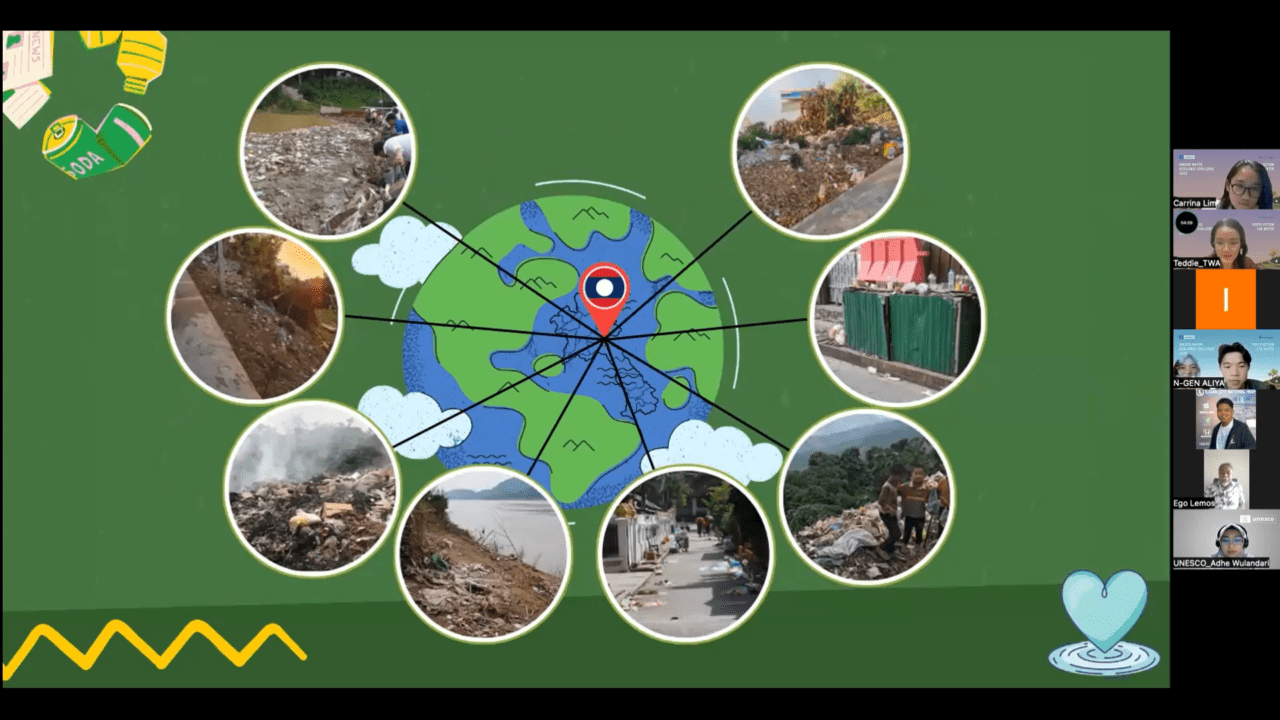
Preserving Paradise – The River’s Role in Luang Prabang’s Heritage: N-Gen Progress aims to empower local people to become active advocates for clean rivers and a sustainable future. They intend to raise awareness about plastic pollution through interactive workshops and post-workshop activities. The interactive workshops will address the effects of plastic pollution on Luang Prabang, the importance of waste management, and introduce recycling and creative activities. The post-workshop activities will engage participants in practical action through volunteer recruitment for clean-up drives, establishing plastic bottle collection points and launching a social media campaign.
Team Nori
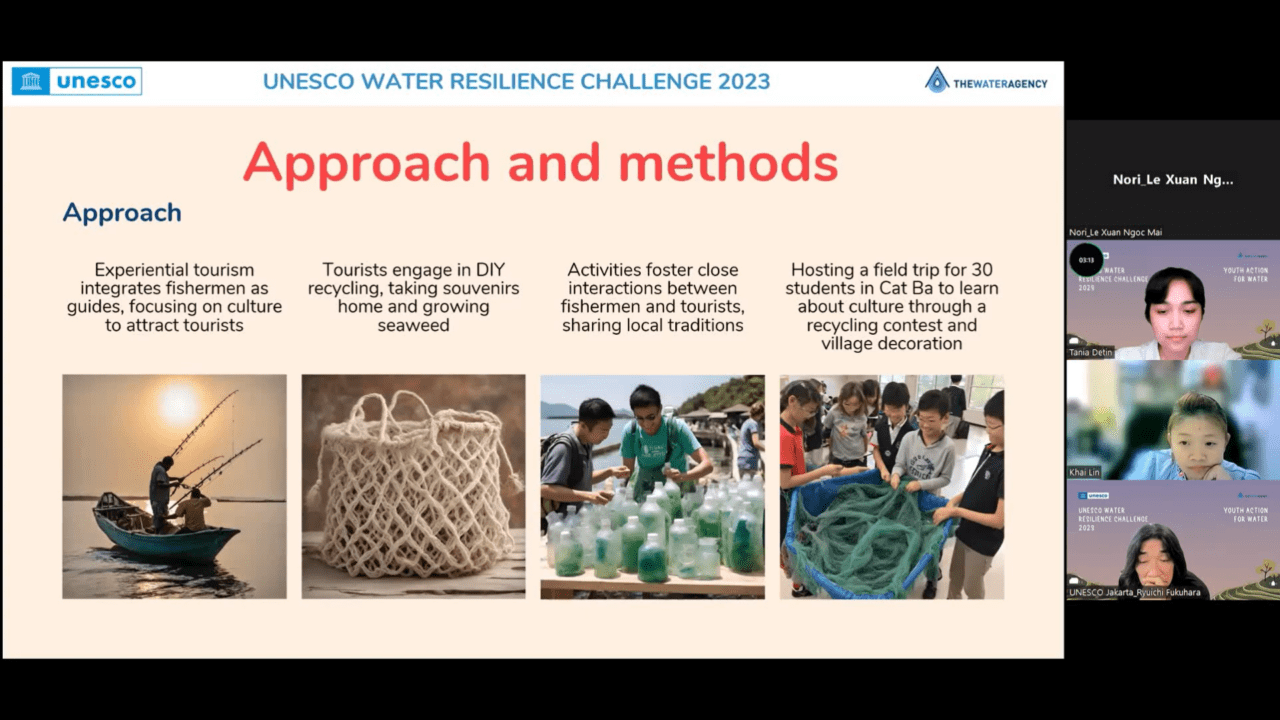
Traditional Aquaculture Associated with Experiential Tourism model in Cat Ba Biosphere Reserve: The Nori team proposes to promote a tourism and fishing model that limits pollution and preserves cultural heritage. Their project focuses on integrating experiential tourism with fishermen as guides. In this approach, tourists can recycle DIY items, bring them home as souvenirs, and grow water-filtering cartilage algae, fostering close interaction between tourists and fishermen. The project also includes a plan to host a field trip for students in Cat Ba to visit the fishing village and learn about the culture. Additionally, social media platforms will promote the beauty of Lien Minh fisherman village and raise awareness for the project.
Team Oceanic UTM

Georgetown Water Resilience Improvement Action – Rainwater Harvesting System: To mitigate flooding and address water scarcity in Georgetown, Oceanic UTM is designing a rainwater harvesting system. The system is expected to reduce flood risks by mitigating surface runoff during heavy rainfall, thereby enhancing the city’s resilience to extreme weather. Additionally, it will provide a supplementary water source for the community during drier periods, addressing the issue of water scarcity in the area.
Team S.O.L.A.R.W.I.S.E
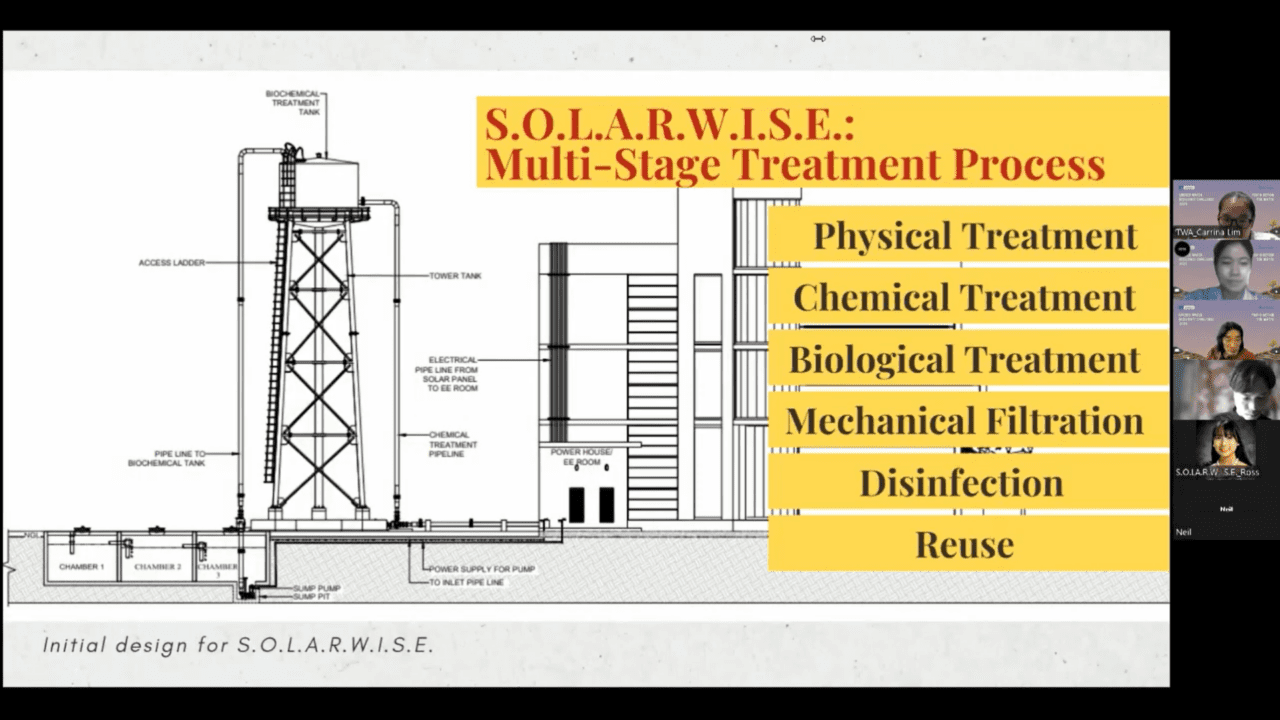
Solar-powered Optimization for Liquid and Aqueous Resource Wastewater Integrated Systems with Enhanced UV Filtration and Biofilter Efficiencies: This project addresses the growing issue of water pollution and improper greywater disposal. It has four main objectives: reducing improper greywater disposal, promoting sustainability, ensuring maintenance, and implementing treatment methods. S.O.L.A.R.W.I.S.E. offers a sustainable, multi-stage approach that treats and reuses greywater from non-toilet plumbing systems. The process uses physical, chemical, biological, mechanical filtration and disinfection to ensure the greywater is safe for reuse.
Team Suwarnadwipa
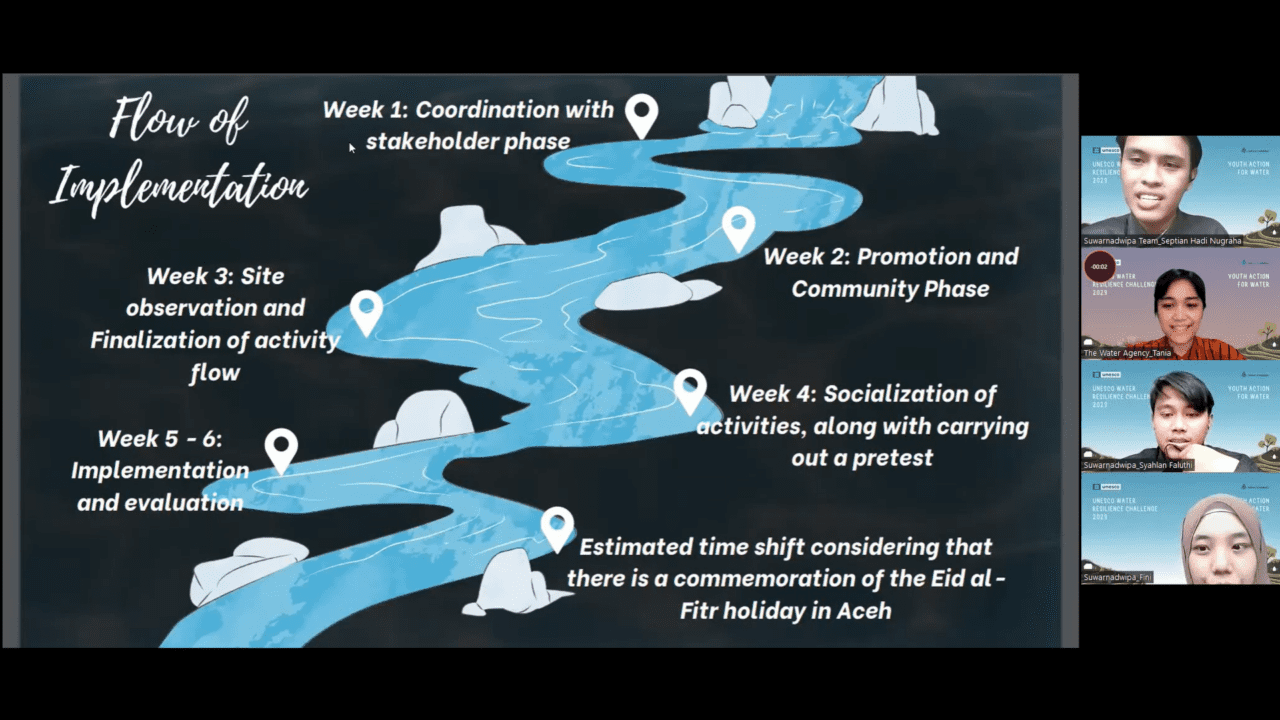
Forest Healing on Water Tourism Education in Gunung Leuser National Park for Reducing Urban Communities’ Stress Level: The Suwarnadwip team’s proposed idea aims to assist the community in improving the economy, achieving below-average cortisol levels through forest healing, preventing deforestation and introducing the role of water. Forest Healing Program utilizes the ecotourism concept, where participants are guided to explore the forest around the village. This will help them understand the daily relationship between the community and their environment, especially the forest and water. The program will include various methods and approaches, such as meditation in the forest, learning Kluet culture and the local wisdom of Alue Keujrun, as well as forest restoration and protection.
Team Tim Banyu
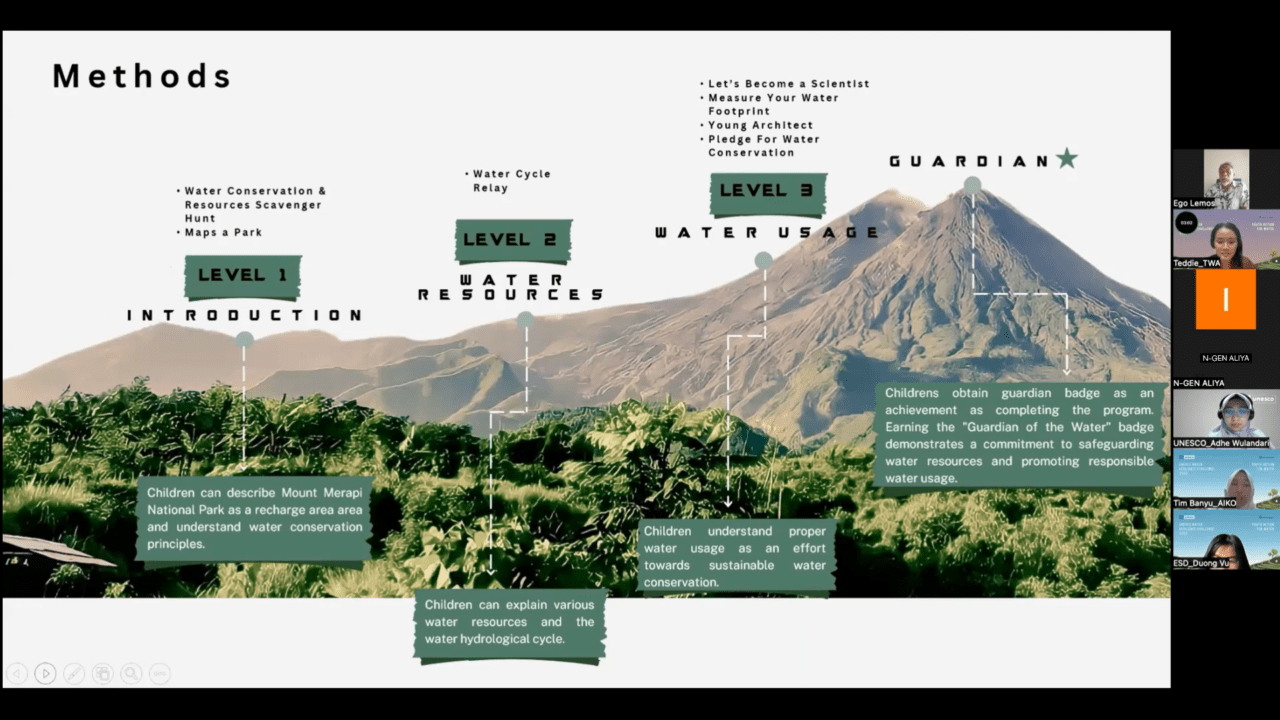
NJOGO BANYU: Tim Banyu offers an engaging and interactive outdoor program for children on water conservation-related issues. The activities will take place in Ledok Sambi, Yogyakarta and will be facilitated by several experienced teachers. This program aims to help children understand the importance of water conservation and usage, equip them with the knowledge and skills to address water-related issues, improve their critical thinking skills to solve these issues and encourage them to adopt water-saving behaviours.
Team Tirta Rangers

Harmonizing Tradition and Tech – Sustainable Fish Farming for Sustainable Water Resources in Lake Batur: This project aims to reduce the fishing industry’s environmental impact and improve water quality by using the Integrated Multi-Trophic Recirculating Aquaculture (IMTRAS) system. The goal is to promote environmental awareness within communities and establish a sustainable fishing industry based on Lake Batur’s heritage through transformative fish farming practices. Tirta Rangers will build a zero-waste, sustainable fish farming system and improve awareness through local wisdom to achieve this objective.
Team Triple-A
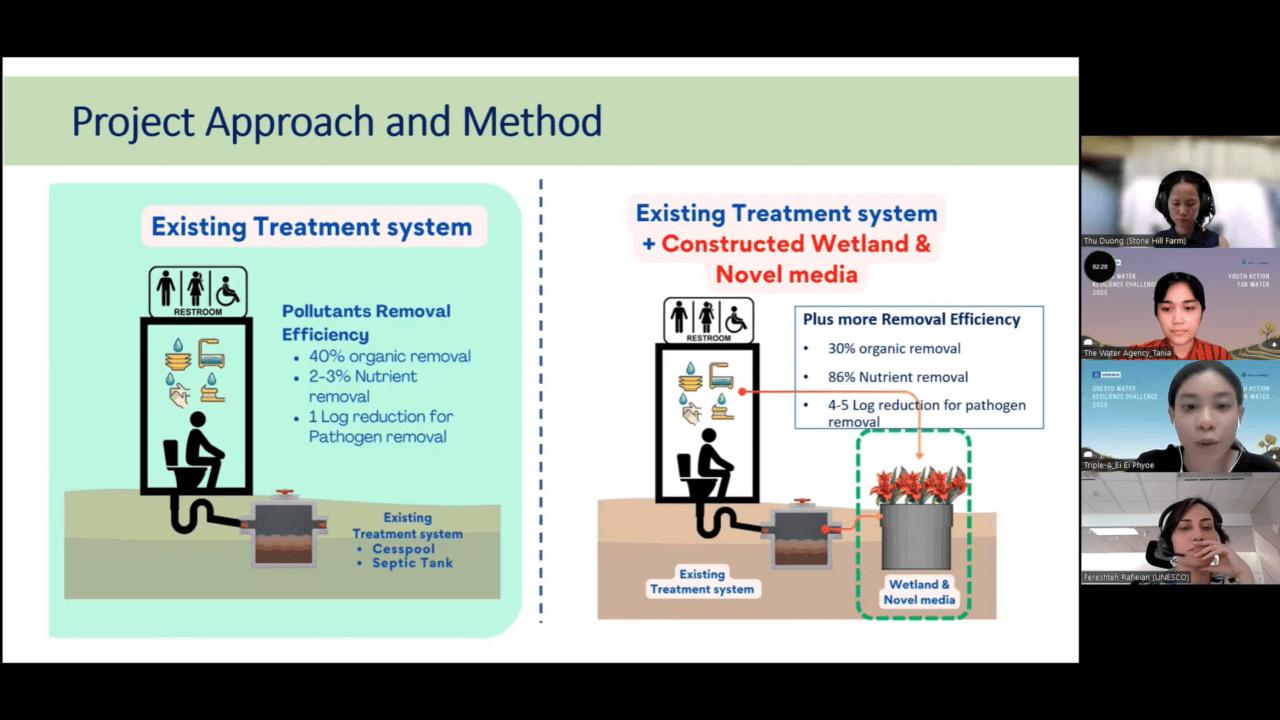
Small-scale Tertiary Treatment System in Khao Yai National Park: This project aims to create a small-scale tertiary treatment system. This will be achieved by using various media types in combination with wetland systems to treat the effluent from conventional systems as a post-treatment process. The main goal of this idea is to reduce the amount of pollutants in the park’s water.
Team Water Warriors
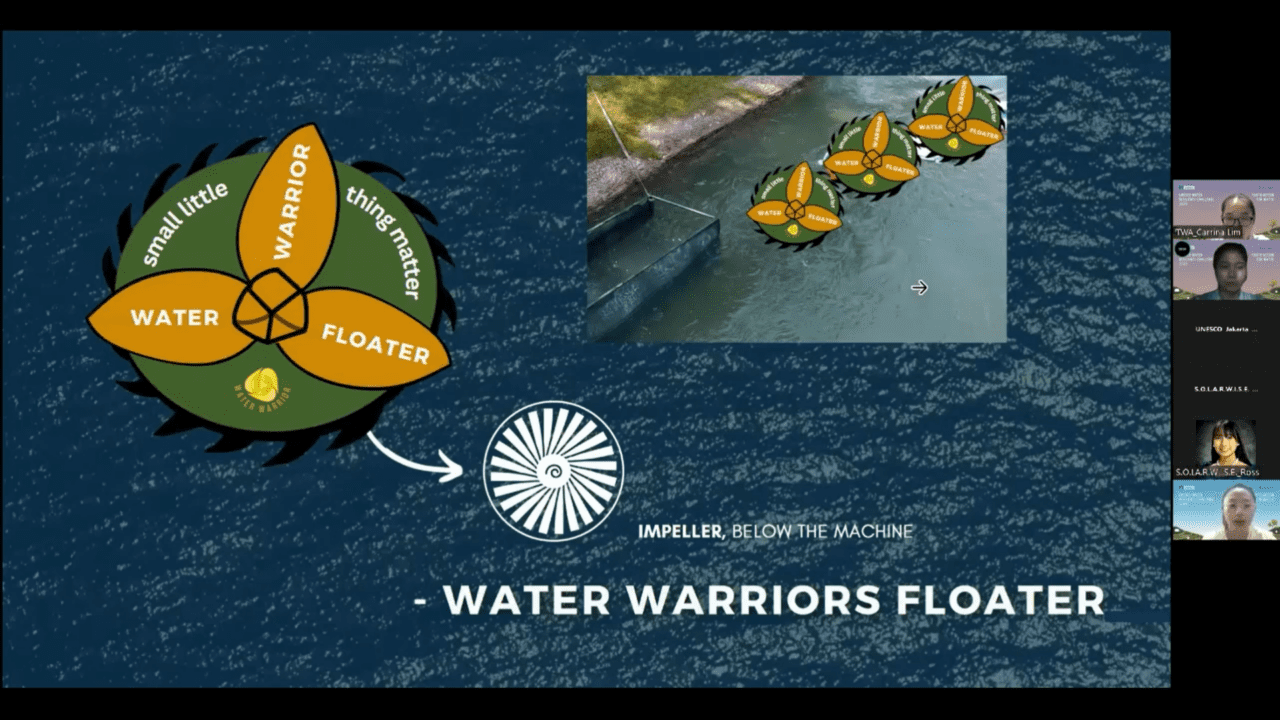
Water Warrior Floater: The Water Warriors team set a goal to improve the living conditions of the Chong Kneas community residing alongside the Tonle Sap River. Their mission is to create a cleaner and safer environment by preventing trash pollution in the river and enhancing the financial well-being of the community. To achieve this, they plan to install floaters on the Tonle Sap River that will collect the garbage before it reaches the river banks.

